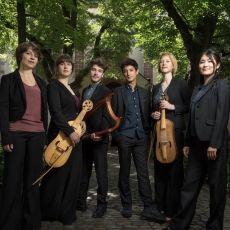Sollazzo Ensemble - Parle qui veut - Gramophone
This has to be one of the most exciting and engaging releases of medieval song in recent years. The Sollazzo Ensemble offer a programme of French and Italian works drawing chiefly on Trecento composers from around Florence and their French counterparts. The moralising theme allows for a great deal of variety from both known and anonymous composers to form a coherent and varied programme. This album forms part of the ensemble’s prize as winners of the 2015 York Early Music Artists Competition and is recorded with a warm clarity by Linn Records in the National Centre for Early Music.
The Sollazzo Ensemble are formed of three voices, two vielles and a harp. Their sound is generally bright, deft and energetic with a very clear focus on text. The singers use a variety of techniques to engage and communicate, from beautiful clear phrasing to crisp, expressive consonants, which at times allows them to tread a deliciously thin line between soft singing and electrifying stage whispers. Every performance on this disc is illuminating, considered and committed. Take for instance the madrigal by Giovanni da Firenze (fl1340-50): Angnel son biancho from the Panciatichi Codex, a moralising tale told from the point of view of a sacrificial lamb. The bright, shimmering sopranos Yukie Sato and Perrine Devillers sing in delicate unison as the voice of this lamb, relishing the onomatopoeic bleating in the text until the actual sacrifice is mentioned, leaving just one soprano to finish the madrigal with poignant stillness.
More than once, this album has confronted me with old favourites performed in new ways. Solage’s (fl late 14th century) harmonically slithery, menacing ballade Le basile I had much admired in the rich, smooth vocalised performance by Gothic Voices on their then groundbreaking album ‘The Study of Love’ (Hyperion, 6/93), but here, Vivien Simon’s gloriously clear tenor voice is absolutely bewitching.

